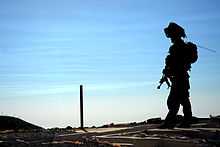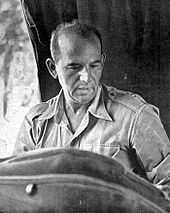Lone soldier

In the Israel Defense Forces (IDF), a lone soldier (Hebrew: חייל בודד, Hayal Boded) is defined as a serviceman or woman without parents in Israel. Lone soldiers serve in regular units and receive various forms of support from the IDF, Israeli government ministries and other organizations.[1] Their exact number fluctuates over time, but is consistently in the thousands; the Jewish Telegraphic Agency reported in April 2012 that there were an "estimated 5,000".[2] About 40% of them serve in combat units.[3] They are generally either overseas Jews volunteering under the Mahal or Tzofim Garin Tzabar programmes, or recently arrived olim chadashim (Jewish immigrants), although other possibilities exist (e.g. orphaned natives). According to an IDF spokeswoman, 8,217 foreign-born personnel enlisted between 2009 and August 2012. The most represented countries of origin were Russia and the United States, with 1,685 and 1,661 recruits respectively.[1]
Lone soldiers receive a higher basic salary from the IDF, as well as financial assistance from the Ministry of Immigrant Absorption and the Ministry of Housing and Construction. They are also given help with housing, and the right to extra time off, including 30 days per year to visit family overseas.[4][5]
Organizations that help lone soldiers include the Lone Soldier Center in memory of Michael Levin, The Benji Hillman Foundation which offers housing and guidance for lone soldiers in Ra'anana, The FIDF/NBN Lone Soldiers Program, The Jewish Agency for Israel the J.A., which traditionally offered support and Chayal el Chayal. The Lone Soldier Center, which is open 24 hours a day, assists lone soldiers and their families overseas, provides meals on the Jewish Sabbath (Shabbat) and Jewish holidays, gives lone soldiers educational and social opportunities, and, where needed, helps them find adoptive families in Israel. The FIDF/NBN provides solutions caring for all olim and lone soldiers at all stages of the process: prior to Aliyah, prior to being drafted, throughout military service and after release from the IDF (when adjusting to a civilian life in Israel).[3]Chayal el Chayal offers an at home environment for pre, present and post army lone soldiers. They provide lodging, Shabbat & Holiday meals, equipment and care packages, trips and spiritual guidance. They also offer a listening ear for parents of lone soldiers.
Where a soldier's parents live in Israel, but he or she is not in contact with them, it is possible for him or her to be designated an "irregular" lone soldier.[5] In early 2011, The Jerusalem Post reported that about 46% of the approximately 5,000 lone soldiers in the military at that time had family in Israel, but were estranged from them.[6] An IDF adviser to lone soldiers told Arutz Sheva in 2012 that most of these were youths from Haredi religious backgrounds, shunned by their families for joining the army.[7] Irregular lone soldier status can also be given if both of an IDF soldier's parents are working abroad for the Israeli government.[5] If a soldier marries while serving in the IDF, he or she loses lone soldier status.[5] A lone soldier's benefits are also at risk if his or her parents themselves move to Israel.[8]
Notable lone soldiers

David "Mickey" Marcus, the State of Israel's first aluf (general), pre-dates the modern concept of a lone soldier, but would perhaps be considered one under today's definition. Born into a Romanian Jewish family in Manhattan, New York in 1901, he served in the United States Army during World War II (achieving the rank of colonel), and joined the nascent Jewish army in Mandatory Palestine in January 1948, doing so under the nom de guerre "Michael Stone". Following the Israeli Declaration of Independence on 14 May 1948 and the establishment of the Israel Defense Forces 12 days later, Marcus commanded the Jerusalem front during the 1948 War until 10 June, when he was killed by friendly fire. Returning to Israeli positions in the middle of the night, Marcus was spotted by an 18-year-old sentry, Eliezer Linski, who did not recognize the general, seeing only a figure in white. Linski requested a password, but the American did not understand the Hebrew challenge; his answer in English meant nothing to Linski, who fired into the air. Marcus attempted to flee, prompting Linski and other sentries to shoot him dead.[9] The general's body was returned to the United States and buried at West Point Cemetery, where it is the only resting place for an American killed fighting under another country's flag.[10] Israel's first prime minister, David Ben-Gurion, regarded Marcus very highly, saying "He was the best man we had."[11]
Michael Levin, born in Holland, Pennsylvania in 1984, made aliyah to Israel in 2002, and joined the Paratroopers Brigade of the Israel Defense Forces. He was on overseas leave in Pennsylvania when the 2006 Lebanon War broke out. Though the IDF told him he was not required to return,[12] he cut his visit short to rejoin his unit, telling his family "I have to go back."[13] When he reported for duty, the IDF assigned him to guard in Hebron, preferring not to send a lone soldier to the front line, but Levin was adamant on fighting in Lebanon, and successfully requested permission to do so with the Paratroopers.[13] He was killed in action on 1 August 2006, the 21st day of the war, by Hezbollah fighters in the Lebanese town of Ayta ash Shab. Of the 41 Israeli soldiers killed up to that point in the 2006 Lebanon War, two others were lone soldiers: an Australian and a Ukrainian.[14] Levin's death received a great deal of attention; over 2,000 people attended his funeral on Mount Herzl in Jerusalem, and a documentary about his life, A Hero in Heaven, was directed and produced by Sally Mitlas, an American filmmaker, and released in 2007.[15] During his life, Levin told of his idea for a center for lone soldiers, which would provide them with meals, support and advice. With the support of Tziki Aud, a Jewish Agency employee who had known Levin,[16] a group of former lone soldiers established the Lone Soldier Center in memory of Michael Levin in 2009.[17]
During the 2014 Israel-Gaza conflict, three lone soldiers were killed: Max Steinberg and Sean Carmeli from the United States, and Jordan Bensemhoun from France.
Rights during IDF service
According to the Lone Soldier Center in memory of Michael Levin, a lone soldier in the Israel Defense Forces has the following rights while serving:[5]
Financial assistance
| Organization | Form of help | Notes |
|---|---|---|
| Israel Defense Forces | Increased basic salary NIS 120 per month for supermarket purchases |
Supermarket money cannot be used to buy alcohol or tobacco Supermarket money not spent each month is lost |
| Ministry of Immigrant Absorption | NIS 352 per month | For olim hadashim (Jewish immigrants) only; must be renewed annually |
| Ministry of Housing and Construction | NIS 402 per month | For olim hadashim only; starts a year after arrival in Israel, and must thereafter be renewed annually |
Help with housing
| Organization | Housing option | Notes |
|---|---|---|
| Israel Defense Forces | Own apartment | A lone soldier can rent his or her own apartment, and receive up to NIS 1,048 towards the rent monthly from the IDF. The original rental contract must be examined by the IDF before financial assistance can start. |
| Beit HaHayal; Soldiers' hostel | These are free of charge and located throughout Israel. It is possible for a lone soldier to live in one from up to three months before his or her draft date. | |
| Kibbutz | Kibbutz accommodation | The IDF can help a lone soldier join a kibbutz. |
| Association for the Wellbeing of Israel's Soldiers (AWIS) | AWIS apartment | A lone soldier can request through the IDF a fully furnished, free-of-charge apartment belonging to the AWIS. These apartments are located throughout Israel. Soldiers do not choose their own roommates. |
Leaves
| Type of leave | How often | Notes |
|---|---|---|
| Errand days | One day every two months | A lone soldier is entitled to at least eight hours every two months to run personal errands, and these cannot be on a Friday, Saturday or national holiday. |
| Parental visit | Four days every six months | For when a lone soldier's mother or father visits Israel; Fridays and Saturdays are not included |
| Overseas leave | 30 days per year, starting from the eighth month of service | Overseas leave dates are chosen by a lone soldier's commander. Once during a combat soldier's service, the IDF will pay for him or her to visit family abroad. |
| Leave for financial reasons | Special dispensation | Where a lone soldier has financial difficulties, he or she may be granted time off to earn money. |
References
- ↑ 1.0 1.1 Rudoren, Jodi (14 August 2012). "Enlisting From Afar for the Love of Israel". The New York Times. Retrieved 15 September 2012.
- ↑ Mandell, Meredith (11 April 2012). "Evangelical couple sees calling as welcoming 'lone' soldiers for Shabbat dinners". New York: Jewish Telegraphic Agency. Retrieved 15 September 2012.
- ↑ 3.0 3.1 "Lone Soldiers Program". New York: Friends of the Israel Defense Forces. Retrieved 15 September 2012.
- ↑ http://www.idfinfo.co.il/Lone_Soldiers_Benefits_Main.php?cat=a2
- ↑ 5.0 5.1 5.2 5.3 5.4 Rights for Lone Soldiers Serving in the IDF (pamphlet). Jerusalem & Tel Aviv: Lone Soldier Center in memory of Michael Levin. 2012.
- ↑ Katz, Yaakov (23 January 2011). "IDF sets up lone soldiers department". The Jerusalem Post. Retrieved 16 September 2012.
- ↑ Ben Gedalyahu, Tsvi (2 January 2012). "'Lone Soldiers' in IDF Now Include Hareidi Youth". Beit El: Arutz Sheva. Retrieved 15 September 2012.
- ↑ Gorshkov, Boris N. (20 April 2007). "Lone soldiers' benefits said to keep parents from making aliya". The Jerusalem Post. p. 6. Retrieved 15 September 2012.
- ↑ Kurzman, Dan (1970). Genesis 1948: The First Arab-Israeli War. New York & Cleveland: World Publishing Company. pp. 439–443.
- ↑ Berkman, Ted (1962). Cast A Giant Shadow: the story of Mickey Marcus who died to save Jerusalem. New York: Doubleday. p. 2. ISBN 9781929354009.
- ↑ Shaw, Fred (5 May 1963). "Ready To Fight For A Belief". The Miami News. p. 6B.
- ↑ Bresky, Ben (24 April 2012). "Yom Hazikaron Tribute for American IDF Soldier Michael Levin". Beit El: Arutz Sheva. Retrieved 16 September 2012.
- ↑ 13.0 13.1 Mandel, Roi (28 April 2009). "Bereaved US mother: Didn't think I'd give Israel so much". Ynet (Tel Aviv). Retrieved 16 September 2012.
- ↑ Moore, Molly (4 August 2006). "U.S. Family Lays 'Lone Soldier' Son to Rest in Israel". The Washington Post. Retrieved 16 September 2012.
- ↑ Berman, Daphna (20 April 2007). "A young Zionist, a lone soldier, a fallen hero". Haaretz (Tel Aviv). Retrieved 16 September 2012.
- ↑ "Michael Levin, z"l". Jerusalem & Tel Aviv: Lone Soldier Center in memory of Michael Levin. Retrieved 16 September 2012.
- ↑ "About Us". Jerusalem & Tel Aviv: Lone Soldier Center in memory of Michael Levin. Retrieved 16 September 2012.
External links
- The Jewish Agency for Israel
- Lone Soldier Center in memory of Michael Levin
- Lone soldiers at the official IDF website
- Association for the Wellbeing of Israel's Soldiers
- Friends of the Israel Defense Forces
- The FIDF/NBN Lone Soldiers Program
- HESEG Foundation
- Mahal IDF Volunteers
- Tzofim Garin Tzabar
- Lone soldiers - anything but alone
- The Benji Hillman Foundation - HaBayit shel Benji
- Chayal el Chayal - The Lone Soldiers Home Away from Home